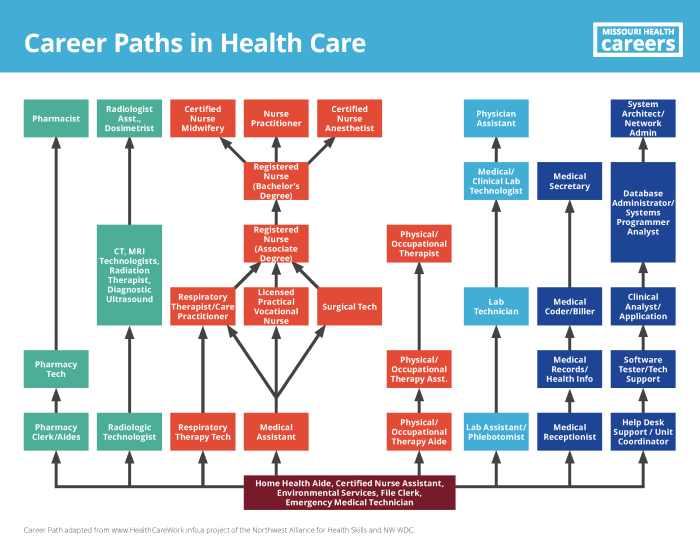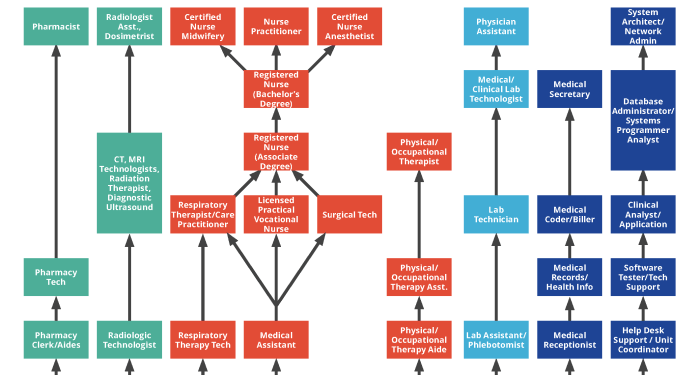Embarking on the Sports Medicine Career Path: Education, Skills, and Pay, this introduction aims to intrigue and inform readers about the exciting journey ahead in this dynamic field.
The following paragraph will delve into the specifics of the topic, providing a comprehensive overview.
Overview of Sports Medicine Career Path
Sports medicine is a specialized branch of healthcare that focuses on the prevention, diagnosis, treatment, and rehabilitation of injuries related to sports and exercise. Sports medicine professionals play a crucial role in helping athletes of all levels, from recreational to professional, to stay healthy and perform at their best.
Significance of Sports Medicine Professionals
Sports medicine professionals are essential in preventing and treating sports-related injuries by providing specialized care tailored to the needs of athletes. They work closely with athletes to develop injury prevention strategies, diagnose and treat injuries, and oversee rehabilitation programs to ensure a safe and speedy recovery.
- Sports Physicians: These doctors specialize in the medical management of sports-related injuries and conditions, providing comprehensive care to athletes.
- Athletic Trainers: These healthcare professionals work with athletes to prevent, diagnose, and treat injuries, as well as provide emergency care on the field.
- Physical Therapists: These professionals focus on rehabilitation to help athletes recover from injuries and regain strength, flexibility, and mobility.
- Sports Nutritionists: These specialists create personalized nutrition plans to optimize athletic performance and support overall health and well-being.
Career Options in Sports Medicine
There are various career paths within the field of sports medicine, offering opportunities to work in different settings such as sports teams, fitness centers, hospitals, and rehabilitation clinics. Professionals in sports medicine can choose to specialize in areas such as orthopedics, cardiology, pediatrics, or exercise physiology to cater to the specific needs of athletes and active individuals.
Education Requirements for Sports Medicine Careers
To pursue a career in sports medicine, individuals must fulfill specific educational requirements that prepare them for the unique demands of working with athletes and active individuals.
Typical Educational Path to Become a Sports Medicine Professional
- Completion of a bachelor's degree in a related field such as exercise science, kinesiology, biology, or athletic training.
- Graduate from an accredited medical school to become a medical doctor (MD) or doctor of osteopathic medicine (DO).
- Completion of a residency program in sports medicine to gain specialized training in the field.
Importance of Specialized Training in Sports Medicine
Specialized training in sports medicine is crucial as it equips professionals with the knowledge and skills needed to diagnose, treat, and prevent injuries specific to athletes. This training also focuses on performance enhancement and overall wellbeing of active individuals.
Comparison of Different Educational Programs Available
| Program | Description |
|---|---|
| Master's in Sports Medicine | Focuses on advanced coursework in sports-related injuries, rehabilitation techniques, and performance enhancement strategies. |
| Doctor of Physical Therapy (DPT) with Sports Medicine Concentration | Combines general physical therapy education with specialized training in sports medicine to address musculoskeletal issues in athletes. |
| Board Certification in Sports Medicine | Available for medical doctors who wish to specialize further in sports medicine and demonstrate expertise in the field. |
Skills and Qualities Needed in Sports Medicine

Effective sports medicine professionals possess a unique set of skills and qualities that are essential for success in this field. These skills not only help in providing optimal care to athletes but also in collaborating with other healthcare professionals to ensure the overall well-being of the athletes.
Communication Skills
Effective communication is a cornerstone of success in sports medicine. Sports medicine professionals need to communicate clearly and effectively with athletes to understand their concerns, explain treatment plans, and build trust. Additionally, strong communication skills are crucial for collaborating with coaches, trainers, and other healthcare providers to create comprehensive care plans for athletes.
Critical Thinking and Problem-Solving Skills
Critical thinking and problem-solving skills are vital in sports medicine practice. Sports medicine professionals often encounter complex injuries and conditions that require quick thinking and innovative solutions. By analyzing information, evaluating options, and making informed decisions, sports medicine professionals can provide the best possible care for athletes.
Job Opportunities and Specializations in Sports Medicine
In the field of sports medicine, there are various job opportunities available for professionals looking to work with athletes and active individuals. These opportunities range from working with sports teams to providing care in hospitals and rehabilitation centers.
Orthopedics
Orthopedic specialists in sports medicine focus on diagnosing and treating musculoskeletal injuries and conditions in athletes. They often perform surgeries to repair injuries such as torn ligaments or fractured bones. Orthopedic surgeons play a crucial role in helping athletes recover and get back to their sport.
Exercise Physiology
Exercise physiologists work with athletes to improve their performance through targeted exercise programs. They assess an individual's fitness levels, create customized workout plans, and monitor progress over time. Exercise physiologists help athletes optimize their training and achieve peak performance.
Athletic Training
Athletic trainers specialize in preventing, diagnosing, and treating sports-related injuries. They work closely with athletes to provide immediate care on the field, as well as long-term rehabilitation strategies. Athletic trainers play a vital role in keeping athletes healthy and safe during training and competition.
Salary and Job Outlook in Sports Medicine
Sports medicine professionals have the potential to earn competitive salaries based on their education, experience, and specialization within the field. Factors such as location, employer, and job demand can also influence salary levels in sports medicine careers. Additionally, the job outlook for sports medicine professionals is promising, with opportunities for growth and advancement in the field.
Salary Range for Sports Medicine Professionals
- Sports medicine physicians can earn an average salary of around $235,000 per year.
- Athletic trainers typically earn between $45,000 to $65,000 annually.
- Physical therapists specializing in sports medicine can earn an average of $87,000 per year.
Factors Influencing Salary Levels in Sports Medicine Careers
- Experience and years in the field can impact salary negotiations.
- Specialization within sports medicine, such as working with professional athletes or in sports rehabilitation, can lead to higher earning potential.
- Location plays a significant role, with urban areas generally offering higher salaries compared to rural areas.
Job Outlook and Growth Opportunities in Sports Medicine
- The demand for sports medicine professionals is expected to grow as awareness of the importance of injury prevention and treatment in athletes increases.
- Advancements in sports medicine technology and research are creating new opportunities for professionals in the field.
- Specializations like sports nutrition, sports psychology, and sports performance coaching are emerging as areas of growth within sports medicine careers.
Wrap-Up
Concluding our discussion on the Sports Medicine Career Path: Education, Skills, and Pay, this summary encapsulates the key points discussed, leaving readers with a deeper understanding of this rewarding profession.
FAQ Compilation
What are the common job opportunities in the field of sports medicine?
Common job opportunities include sports team physician, athletic trainer, physical therapist, and exercise physiologist.
Is specialized training necessary for a career in sports medicine?
Yes, specialized training is essential to gain the necessary skills and knowledge to work effectively in the field of sports medicine.
What factors can impact the salary levels of sports medicine professionals?
Factors such as experience, location, level of education, and specialization can influence the salary levels of sports medicine professionals.











